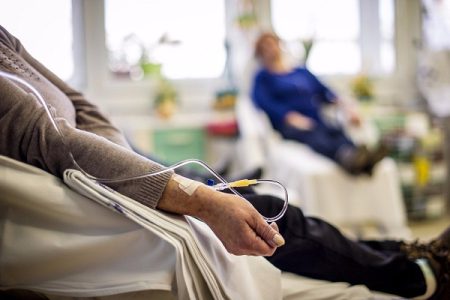Colon Cancer Pain (Bowel Cancer Pain): Characteristics and Its Management
- Updated on: Jul 8, 2024
- 5 min Read
- Published on Apr 21, 2021

Colon cancer is cancer of the large intestine. In most cases, it begins as small, non-cancerous lump of cells called adenomatous polyps. Some of these polyps can become colon cancers gradually over a period of time.
Colon cancer pain, colorectal cancer pain
Many people with colorectal cancer do not experience any symptoms in the early stages of the disease. When symptoms appear, they may vary depending on the size and location of the cancer in your colon.
Persistent abdominal discomfort, cramps, gas or pain are some common symptoms of the colon cancer. In fact, abdominal pain is the most common symptom of colon cancer.
Pain is usually accompanied with bleeding and a decrease in the quantity of stools, change in bowel habits. Acute large intestine obstruction may cause progressive abdominal distention, pain, vomiting and constipation.
The colon cancer pain symptoms are unique for every patient. Therefore, your doctor will prepare your pain management plan that is most suitable for your individual case.
How painful is colon cancer? What is colon cancer pain like?
Cancer pain is usually dull and annoying in right colon. One may confuse it with gall bladder disease or peptic ulcer. In patients with rectal cancer, pain is a usually a late manifestation.
The severity and nature of pain may vary. Pain itself may be dull, achy or sharp. Colon cancer pain may occur frequently or once in a while. It may be mild, moderate or severe. The pain you experience may depend on your cancer type and stage, how much the cancer has spread, and how sensitive you are to pain (whether your pain tolerance is low or high).
What causes the colorectal cancer pain? Why do you have pain with colon cancer?
The pain associated with cancer generally comes from the tumor. The tumor presses the nerves, bones or other organs causing mild to severe pain.
Sometimes, these tumors may grow unnoticed or remain undetected until serious damage and weakening of the wall of the colon has happened. This may cause perforation through the wall of the colon in the tumor surroundings. If this happens, the patient may experience tenderness to pressure and pain at the site of the perforation. If the perforations (holes) are large enough to cause leakage of the stuff from the colon into the abdominal cavity, you will develop acute pain.
The pain may be accompanied with fever and inflammation, in some cases. Peritonitis is the condition that is characterized with inflammation of the lower abdominal cavity and can be acutely painful. In this condition, the abdomen becomes extremely tender to touch. The condition may even cause normal activities such as walking, breathing, coughing, moving or any other activity that involves movement of the inflamed intestine difficult. Acute peritonitis is a medical emergency, and the hole in the intestinal wall need to be repaired urgently through a surgical intervention.
Pain may also occur as side effects of common cancer treatments such as chemotherapy, radiation therapy and surgery.
Chemotherapy may cause peripheral neuropathy, which may cause tingling, numbness and weakness in your hands, arms or legs. In peripheral neuropathy, the nerves in the peripheral nervous system become damaged due to the side effects of cancer treatment. Peripheral neuropathy symptoms affect the nerves that provide sensation, which causes pain, tingling, and burning sensation to a person.
Colon cancer pain location (pain in colon area)
Many people ask such questions – Where is colon cancer pain located? What is the bowel cancer pain location?
The location of the colon cancer pain may vary based on the cause of the pain. The pain may occur as a result of a variety of reasons as discussed above.
Ascending Colon Symptoms
Cancers in this part of the colon usually remain unnoticed for a long time. The cancers may therefore grow to quite large in size before a person experiences any symptoms. People with these types of cancers may feel a mass in the right abdomen that may cause abdominal pain among other symptoms. These symptoms can be explained by the anatomy of the ascending colon. The ascending colon is wider than its descending section. This allows for more growth of the tumor before the tumor causes symptoms. The tumor in the ascending colon grows along the wall of the colon instead of directly outward into the cavity. Pain and other symptoms on the left side of the colon are usually caused by growth outward into the lumen.
Descending Colon Symptoms
The symptoms of left-sided colon cancer are explained with the anatomy of this portion of the colon. The lumen of the colon is smaller than that of its counterpart on the right side. The pain and other symptoms are experienced due to obstruction of the lumen. Although these symptoms can be seen in cancers in the right colon too, but they are mostly noted in the left because the stool is more solid in the descending colon. The stool is stays liquid in the ascending colon. People with left-sided cancers generally experience pain in the abdomen, abdominal distention, vomiting, nausea, and constipation.
Colon cancer pain management
Throughout your treatment for colorectal cancer, pain management remains an important aspect for improving your overall quality of life.
Pain management is a branch of medicine for reducing pain and improving the quality of life of patients. It is particularly important for cancer patients as most patients experience pain even after the treatment. People with advanced cancer likely experience severe pain and require pain management care.
Your doctor may use a variety of options to control pain arising due to colon cancer (bowel cancer), such as:
- Nerve block treatment options
- Physical therapy
- Acupuncture
- Auriculotherapy
- Massage therapy
- Medications
- Implanted pain pumps
- Relaxation techniques and guided imagery
- Chiropractic treatment
- Naturopathic medicine
- Oncology rehabilitation
- Surgery
Surgical recovery
Pain is a common side effect of colon cancer surgery. This could be due to several reasons. One of the reasons is that you may have developed adhesions as a result of the surgery. This can lead to bowel obstructions or abdominal pain as well.
Many people develop these adhesions after colon surgery and experience extreme distress in addition to the physical pain. The adhesions may cause a blockage of the bowel which required emergency surgery. Most people who have adhesions do not even know what is happening to them and feel that they should have been warned about them in advance. The period immediately after the surgery may appear a shock to many cancer patients as they see themselves connected to machines, tubes, and drips etc.
Controlling the post-surgery pain is needed to help patients recover from the surgery with fewer or no complications. Your cancer care team will prepare recovery plans after the surgery. These recovery methods may involve controlling on the amount of narcotics intake as drug compositions. These methods help patients resume their normal activities after the surgery.
Managing side effects
Some techniques of managing pain may also have side-effects. These may include nausea, vomiting, itching, constipation, and drowsiness. It is therefore important to monitor the dosage, duration for taking the medicine, and the medicine itself to observe if you experience fewer side effects with any change in the treatment. Your doctor may recommend nutrition therapy, naturopathic medicine, mind-body medicine and other types of care in order to manage these side effects.













1 Comment
It’s onerous to search out knowledgeable individuals on this topic, however you sound like you understand what you’re talking about! Thanks